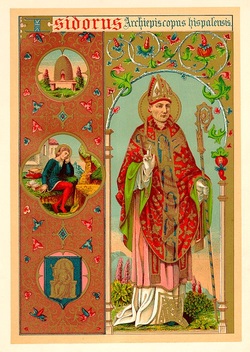
When he was Archbishop no tongue can tell how leal he was, how lowly and meek, and merciful, how careful to restore the laws of Christianity and the Church, and how unwearied in establishing the same by his word and writings, yea, how brightly he shone in all graces. He was a leading promoter and spreader of monastic institutions throughout Spain. He built many monasteries. He founded colleges in which, when his duty allowed him spare time for sacred study and reading, he taught the many disciples who betook themselves to him from all quarters. Among these, two of the most distinguished were the holy Bishops Ildephonsus of Toledo, and Braulio of Saragossa. He called the Council of Seville, wherein, in a most incisive and eloquent discourse, he shattered and crushed the heresy of the Acephali, by which Spain was then threatened. So great was his fame among all men for the holiness of his life and doctrine, that scarcely sixteen years after his death the whole Council of Toledo, by the acclamation of more than fifty Bishops, among whom was the holy Ildephonsus himself, declared him to be worthy to called the excellent Doctor, the newest ornament of the Catholic Church, one whose learning would endure to the end of the world, and of worshipful memory. It was the opinion of the holy Braulio that he was not only fit to be compared to Gregory the Great, but also that he was a gift from God to Spain to take the place of the Apostle James.
Isidore wrote Books of Etymologies and on Church Offices, and likewise many others, so useful in the administration of Christian and Church Law, that the holy Pope Leo IV felt no scruple in writing to the Bishops of Britain, that the sayings of Isidore were worthy to be kept like those of Jerome and Augustine, whenever there is to be done some strange work, wherein the rules of the Canon Law are not enough defined. Many sentences from his writings may also be discovered embedded in the Canon Law of the Church itself. He presided over the Fourth Council of Toledo, the most celebrated that ever met in Spain. Before his death he had purged Spain of the Arian heresy, and publicly foretold his own dissolution and the wasting of the kingdom by the Saracens which was to come. He passed away to heaven, at Seville, where he had ruled his Church for forty years, in the year of our Lord 636. In accordance with his own commands, his body was first buried between his brother Leander and his sister Florentina, but Ferdinand I, King of Castille and Leon, bought it for a great price from Enet, the Saracen, who then ruled at Seville, carried it to Leon, and there built a Church in honour of him




